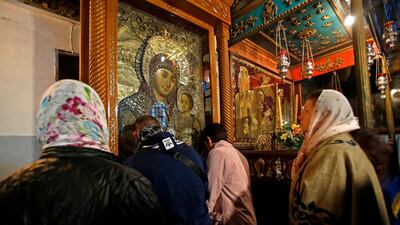It being Christmas, there is a certain obligation to bring glad tidings, or at least as glad as is possible in a year marked by deepening discontent and divisions in many parts of the world.
This despite the Palestinian-Israeli issue ramping up a contentious notch earlier this week when Fatou Bensouda, chief prosecutor at the International Criminal Court (ICC), said she wanted to open an investigation into Israel’s alleged war crimes in the Palestinian territories. The case was brought by the Palestinians after the 2014 war in Gaza. It led to angry Israeli reaction, with Benjamin Netanyahu, the prime minister, insisting that the ICC had no basis for the “outrageous decision [and] only has jurisdiction over petitions submitted by sovereign states. But there has never been a Palestinian state".
Away from the spotlight was another, more heartening development, and a gradualist, slow-motion attempt to build bridges and tear down walls. In Nazareth and Bethlehem, in the week before Christmas, a multi-faith grassroots movement called the Abrahamic Reunion (AR) organised two peace gatherings. The idea was to bring together Jews, Muslims, Christians and Druze to know “the other” and work at the long-running conflict in that spirit of engagement. In Nazareth, at least a couple of hundred people gathered to discuss what they did not know about other faith communities, to break bread together and then travel up to Mount Precipice – the hill known to Christians from the Bible – to release hundreds of balloons for peace. In Bethlehem, there was a party for peace – with Christmas songs sung in Arabic and a hearty dinner.
The point of all of this was very simple for all the inherent complexities. It was to counter “some of the narratives that speak of the impossibility of coexistence”, as AR chairman and co-founder David Less, a meditation teacher originally from New York, put it. Through peace gatherings, "we are finding areas of commonality between Israel and Palestine that have not necessarily been explored. The groups we’re working with are not political but are families, young people, educators and clergy," Mr Less said.

Quite so. The roster of speakers in Nazareth was varied and impressive. It included Shaykh Mowafaq Tarif, the spiritual leader of Israel's Druze community; Reverend Hanna Kildani, a Jordanian Catholic priest who serves as the Latin patriarchal vicar for Israel and is active in interfaith dialogue; Rabbi Shlomo Dov Rosen, director of Jerusalem's Yakar Synagogue; Imam Halmi Hamad of the Qadari order and Hisham Sulliman, an Arab-Israeli actor known for his role in the film Bethlehem and for a popular Israeli television series Fauda. Meanwhile in Bethlehem, those who urged the assembled diners of different faiths to know "the other" included Sheik Rafaat, a prominent cleric from Nablus, Suleiman Suleiman, a Muslim jurist, and Greek Orthodox priest Issa Thaljieh of Bethlehem's Church of the Nativity, the oldest Christian church in the world.
Exhortations of course are one thing; their practical application is devilishly difficult. The gaps between the two sides of the Palestinian-Israeli conflict “have never been wider”, as veteran US presidential adviser and peace envoy Dennis Ross recently said. Mr Ross, who worked on Bill Clinton’s Camp David summit of 2000 involving then Israeli prime minister Ehud Barak and then Palestinian Authority chairman Yasser Arafat, now discerns a “sense of hopelessness that pervades Israeli and Palestinian attitudes about the prospects of peace”. It has marked, he said, by “deep disbelief on both sides” with both the Israeli and Palestinian people having lost faith in the prospects of a resolution. This has resulted in greater entrenchment of political positions on both sides.
Mr Ross noted that in Israel’s last three elections – 2015, April 2019 and September 2019 – the main opposition candidates, Yitzhak Herzog and Benny Gantz, did not make peace a campaign issue. As for Palestinian leaders, they fear the backlash of any concessions. With the looming battle to succeed current Palestinian Authority president Mahmoud Abbas, Mr Ross said that “those around him are positioning themselves for the future – and they know succession is a period where purity, not accommodation, is the political coin of the realm”. Indeed, the latest poll of public opinion by the Palestinian Centre for Policy and Survey Research in the West Bank and the Gaza Strip in mid-March showed that the majority no longer believes a two-state solution to be practical, feasible or round the corner.
In the circumstances, what to make of initiatives such as the AR’s peace gatherings? Sceptics would point to a dispiriting truth: the AR has been working this route in Israel and the Palestinian territories for nearly two decades yet peaceful resolution and reconciliation have only become more elusive in that period.
But then there are the dreamers who cite the evidence of a “shared society” that they see coming into being. At the Nazareth event, I met two rabbis – Raanan Mallek and Or Zohar, who respectively serve in Shorashim and Hararit villages in Galilee in northern Israel. Both argue that their villages, which are part of the larger Misgav Regional Council, are marked by a spirit of collaboration between Jews and Arabs. Misgav has a Jewish mayor and an Arab deputy, said Rabbi Or Zohar, and “Jews and Arabs in the region are awakening to the fantasy of ever living in a country in which the other doesn’t exist”.
That is not the impression we get about the region – at least, not yet. Perhaps the good news is not coming from politicians but from small initiatives in unregarded places. Maybe it will percolate up. We can but hope.


